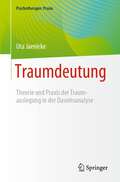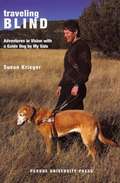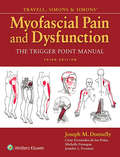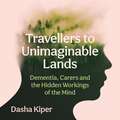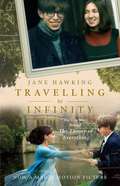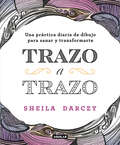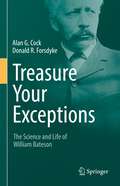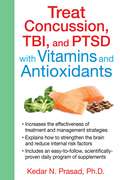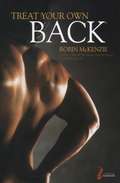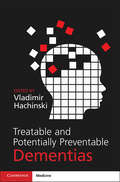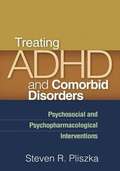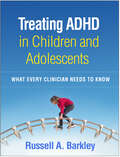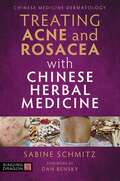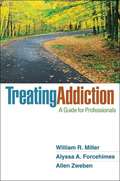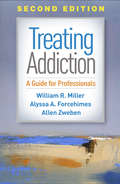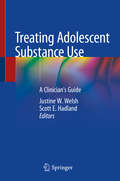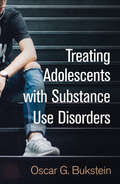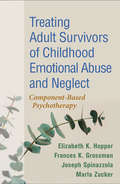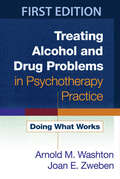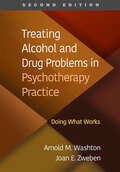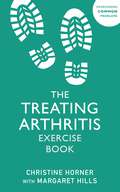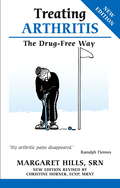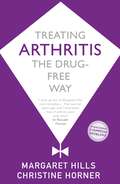- Table View
- List View
Traumdeutung: Theorie und Praxis der Traumauslegung in der Daseinsanalyse (Psychotherapie: Praxis)
by Uta JaenickeIn diesem Buch wird ein neuer Zugang für die Arbeit mit Träumen in der Psychotherapie vorgestellt. Das praktische Vorgehen wird nachvollziehbar aus der existenzphilosophisch fundierten Theorie hergeleitet und anhand von vielen illustrativen Beispielen veranschaulicht. Träume erweisen sich dabei als hilfreich, grundlegende Problematiken des Patienten zu erkennen und therapeutisch fruchtbar zu machen. Im Verlauf einer Therapie geben Träume Aufschluss über Veränderungen, Entwicklungen und Blockierungen im therapeutischen Prozess, insbesondere auch in Bezug auf die therapeutische Beziehung. Aus dem Inhalt: Träume in ihren verschiedenen Zusammenhängen: (1) in Bezug auf bedeutsame Wacherfahrungen des aktuellen Lebens und der früheren Lebensgeschichte, (2) in Bezug auf die therapeutische Situation, die therapeutische Beziehung, als Indikator für Veränderungen im Verlauf der Therapie, (3) in Bezug auf grundsätzliche emotionale Problematiken (z. B. Ängste, Wünsche, Unsicherheiten, Konflikte, Abwehrhaltungen), (4) in Bezug auf charakteristische Persönlichkeitszüge (z. B. depressiv, zwanghaft), (5) in Bezug auf eine verborgene Auseinandersetzung mit Fragen des Menschseins. Über die Autorin: Dr. med. Uta Jaenicke, Fachärztin für Psychiatrie und Psychotherapie in eigener Praxis, Lehranalytikerin, Supervisorin, Dozentin am Daseinsanalytischen Seminar in Zürich. Langjährige intensive Auseinandersetzung mit Träumen in Theorie, Lehre und Praxis.
Traveling Blind: Adventures in Vision with a Guide Dog by My Side
by Susan KriegerKrieger (feminist studies, Stanford U.) recounts her experiences as a newly blind person learning to navigate with her guide dog.
Travell, Simons & Simons' Myofascial Pain and Dysfunction: The Trigger Point Manual
by Joseph DonnellyPublisher's Note: Products purchased from 3rd Party sellers are not guaranteed by the Publisher for quality, authenticity, or access to any online entitlements included with the product. This new edition of Travell, Simons & Simons' groundbreaking work reflects the latest research and best practices associated with trigger points and updates the iconic pain point images that set the standard in the field. New lead editor Joseph M. Donnelly draws on his experience as both educator and physical therapy practitioner to integrate an evidence-based approach into this critical text. In addition, the new edition consolidates information to create a more intuitive user experience and features a completely new full color design to bring concepts to life.
Travellers to Unimaginable Lands: Dementia, Carers and the Hidden Workings of the Mind
by Dasha Kiper'The best book I have ever read that explores the effect on the brain of the carer, when someone has dementia. Unmissable' Professor June Andrews, dementia expert and author of Dementia: The One-Stop Guide.A husband believes his wife is an imposter. A man's sudden, intense Catholic piety provokes his wife. A mother and daughter struggle to come to terms with the disease that intensifies an already dependent relationship.At their root, these existential dilemmas grow out of long-established patterns of behaviour that bind together patients and caregivers. Travellers to Unimaginable Lands explores the complex and profound psychology of caregiving, illuminating how the healthy brain's biases and intuitions make caring for people with dementia disorders so profoundly and inherently difficult.Blending neuroscience, psychology, philosophy and literature with beautifully-observed case studies, Kiper illuminates the underlying mental mechanisms behind carers' experiences, dispels the myth of the perfect caregiver and, in the process, opens the door to understanding and forgiveness.
Travelling To Infinity: My Life with Stephen
by Jane HawkingMade into a major motion picture, this moving memoir written by Stephen Hawking's first wife covers the turbulent years of her marriage to the astrophysics genius, her traumatic divorce, and their recent reconciliation. Professor Stephen Hawking is one of the most famous and remarkable scientists of our age and the author of the scientific bestseller A Brief History of Time, which has sold more than 25 million copies. In this compelling memoir, his first wife, Jane Hawking, relates the inside story of their extraordinary marriage. As Stephen's academic renown soared, his body was collapsing under the assaults of a motor neuron disease. Jane's candid account of trying to balance his 24-hour care with the needs of their growing family reveals the inner strength of the author, while the self-evident character and achievements of her husband make for an incredible tale presented with unflinching honesty. Jane's candor is no less apparent when the marriage finally ends in a high-profile meltdown, with Stephen leaving Jane for one of his nurses and Jane marrying an old family friend. In this exceptionally open, moving, and often funny memoir, Jane Hawking confronts not only the acutely complicated and painful dilemmas of her first marriage, but also the relationship's fault lines exposed by the pervasive effects of fame and wealth. The result is a book about optimism, love, and change that will resonate with readers everywhere.
Trazo a trazo
by Sheila DarceyTransforma tu vida, procesa tus emociones y encuentra la alegría trazo a trazo Durante una época complicada de su vida, la autora, Sheila Darcey descubrió que trazar y hacer dibujos de estilo libre y de darle forma física a sus pensamientos, emociones e ideas, era un modo muy útil y que tenía alto impacto para procesar lo que sentía. Un simple dibujo se convirtió en una práctica diaria, una herramienta terapéutica y meditativa que Sheila ha enseñado y compartido con miles de personas. Trazo a trazo te ayudará a desarrollar una práctica diaria de dibujo que te llevará del pensamiento negativo a un mundo de posibilidades infinitas. Al usar el arte para conectar tu cerebro izquierdo con tu cerebro derecho, este libro desbloqueará tu necesidad humana básica de crear, expresar y sentir, independientemente de si te consideras un artista ono. En este libro encontrarás más de 40 sugerencias para dibujar sobre una variedad de temas, desde la esperanza hasta la quietud, que te ayudarán a conectar, a practicar la atención plena y a aceptar los cambios. Con cada dibujo descubrirás que puedes procesar tus experiencias de una manera nueva y poderosa. Paso a paso, boceto a boceto, encontrarás paz, creatividad y sanación sobre la página.
Treasure Your Exceptions: The Science and Life of William Bateson
by Donald R. Forsdyke Alan G. CockThis biography provides an understanding of William Bateson as well as a reconciliation of diverging views (e.g. the hierarchical thinking of Gould and the genocentrism of George Williams and Richard Dawkins). Evolutionists may thus, at long last, present a unified front to their creationist opponents. The pressing need for this text is apparent from the high percentages reported not to believe in evolution and the growth of the so-called "intelligent design" movement.
Treat Concussion, TBI, and PTSD with Vitamins and Antioxidants
by Kedar N. PrasadThe most up-to-date resource on nutritional supplements for the prevention and improved management of concussive injury, TBI, and PTSD • Provides an easy-to-follow program of supplements to optimize the benefits of treatment programs and offer a method of prevention beyond the use of helmets • Shows how standard treatments do not address the oxidative stress, chronic inflammation, and high glutamate levels that promote brain injury progression • Explains how single micronutrients do not provide the same preventive benefits as the synergistic combinations explored in the book The human brain is highly complex. When brain injury strikes, whether from a blow to the head or the shock of physical or emotional trauma, successful treatment requires a multilevel approach, taking into account the health of the brain prior to injury. Multilevel, complementary treatment approaches can also be applied to strengthen the uninjured brain and help prevent neurological injury for those at high risk of concussion, post-traumatic stress disorder, and traumatic brain injury. In this practical scientific guide, leading researcher in cancer, heart disease, and Alzheimer’s prevention Kedar N. Prasad, Ph.D., reveals the latest revolutionary discoveries on the use of antioxidants and micronutrients to manage and prevent concussive injury, TBI, and PTSD. He explains that increased oxidative stress, chronic inflammation, and glutamate release are common underlying factors in these conditions and should be addressed for improved management. He debunks the flawed conclusions of the neurological community that vitamins and antioxidants are ineffective for these conditions, revealing how their studies focused on specific micronutrients rather than synergistic combinations. The author details his easy-to-follow supplement program to treat and prevent these injuries, outlining the correct daily amounts and proper combinations of vitamins, antioxidants, micronutrients, and polyphenolic compounds such as curcumin and resveratrol. Offering the missing complement to standard medical care of brain injury as well as a form of prevention beyond the use of helmets, this guide provides a truly holistic approach to the prevention and management of concussive injury, TBI, and PTSD.
Treat Your Own Back
by Robin MckenzieMaintain effective long-term back self-management with Robin McKenzies completely revised and formatted 9th edition landmark patient book. This informative, easy-to-read book contains updated content from Robin McKenzie.
Treatable and Potentially Preventable Dementias
by Vladimir HachinskiThe first comprehensive and authoritative book covering the basis for the joint prevention of stroke and the management, delay, or prevention of some dementias. Engaging with the concept of cerebrovascular disease as asymptomatic, with overwhelming evidence that major dementias involve a vascular component, ranging from 60 per cent in frontotemporal dementia to 80 per cent in Alzheimer disease - doubling the chances of silent brain pathology manifesting as dementia. Beginning with a review of the basics, describing typical patients and presentations and providing clear guidelines in diagnoses, management, and prevention, this vital guide is invaluable for physicians dealing with cognitive impairments, including family physicians, psychiatrists, internists, geriatricians and neurologists, worldwide. This book provides a new, coherent and promising approach, filling the gap between what is known and what is applied, offering a great opportunity for appropriate interventions and treatments that make a difference. Improving outcomes, beginning now.
Treating ADHD and Comorbid Disorders
by Steven Pliszka Larry GreenhillChildren and adolescents with attention-deficit/hyperactivity disorder (ADHD) frequently experience co-occurring problems with aggression, mood swings, tics, anxiety, or depression. Organized around detailed case presentations, this highly informative book helps the clinician make sound decisions when assessing and treating the full range of ADHD comorbidities. Experienced child psychiatrist Steven Pliszka offers straightforward guidance on how to avoid common diagnostic errors, develop an individualized medication regimen, minimize health risks and side effects, collaborate successfully with parents, and tailor psychosocial treatments to each family's needs. A reproducible structured interview facilitates sorting out symptoms and distinguishing between different comorbid disorders.
Treating ADHD in Children and Adolescents: What Every Clinician Needs to Know
by Russell A. BarkleyFrom foremost authority Russell A. Barkley, this book presents essential principles and practices for managing attention-deficit/hyperactivity disorder (ADHD) in children and teens. Barkley interweaves the best scientific knowledge with lessons learned from decades of clinical practice and research. He provides guidelines and clinical tips for conducting thorough, accurate assessments and developing and implementing science-based treatment plans. The book is grounded in Barkley's theory of ADHD as a disorder of executive functioning and self-regulation. Ways to collaborate successfully with parents and other professionals are highlighted throughout. In a convenient large-size format, the volume includes 45 reproducible handouts and forms that can be downloaded and printed for repeated use.
Treating Acne and Rosacea with Chinese Herbal Medicine
by Sabine SchmitzThis practical, fully illustrated handbook is the second in our series on dermatological diseases and their treatment with Chinese herbal medicine by Sabine Schmitz. This volume examines the cause and treatment of acne and rosacea from a Chinese medicine perspective and provides advice for practitioners on their treatments in their daily practice.It covers prescriptions and treatment options for all types of acne, rosacea and TCM syndromes, detailed case studies and colour photographs of the skin and tongue for precise diagnosis. The book also contains instructions on external applications such as pastes, washes or ointments, as well as detailed diet instructions and advice.Easy to read, use and navigate, Treating Acne and Rosacea with Chinese Herbal Medicine is the perfect resource for anyone treating skin diseases in their daily practice, regardless of their specialization.
Treating Addiction
by William R. Miller Alyssa A. Forcehimes Allen ZwebenAn indispensable practitioner reference and text, this engaging book focuses on how to provide effective help to clients with substance use disorders. The authors, leading authorities on addiction treatment, present a state-of-the-art framework for assessment and treatment. They describe and illustrate evidence-based treatment methods, including cognitive-behavioral, 12-step, motivational, pharmacological, and family approaches. Also addressed are such crucial clinical issues as resistance, maintenance of change, treating co-occurring disorders, and spirituality. Reproducible clinical tools can be photocopied from the book or downloaded and printed in a convenient 8 1/2" x 11" size. Of special utility, the companion website features more than 25 widely used, ready-to-download assessment tools, assembled in one place for the first time, together with the authors' guidance for using them throughout the process of treatment.
Treating Addiction
by William MillerAn indispensable practitioner reference and text, this engaging book focuses on how to provide effective help to clients with substance use disorders. The authors, leading authorities on addiction treatment, present a state-of-the-art framework for assessment and treatment. They describe and illustrate evidence-based treatment methods, including cognitive-behavioral, 12-step, motivational, pharmacological, and family approaches. Also addressed are such crucial clinical issues as resistance, maintenance of change, treating co-occurring disorders, and spirituality. Reproducible clinical tools can be photocopied from the book or downloaded and printed in a convenient 8 1/2" x 11" size. Of special utility, the companion Web page features more than 25 widely used, ready-to-download assessment tools, assembled in one place for the first time, together with the authors' guidance for using them throughout the process of treatment.
Treating Addiction, Second Edition: A Guide for Professionals
by William R. Miller Alyssa A. Forcehimes Allen ZwebenThis widely respected text and practitioner guide, now revised and expanded, provides a roadmap for effective clinical practice with clients with substance use disorders. Specialists and nonspecialists alike benefit from the authors' expert guidance for planning treatment and selecting from a menu of evidence-based treatment methods. Assessment and intervention strategies are described in detail, and the importance of the therapeutic relationship is emphasized throughout. Lauded for its clarity and accessibility, the text includes engaging case examples, up-to-date knowledge about specific substances, personal reflections from the authors, application exercises, reflection questions, and end-of-chapter bulleted key points. New to This Edition *Chapters on additional treatment approaches: mindfulness, contingency management, and ways to work with concerned significant others. *Chapters on overcoming treatment roadblocks and implementing evidence-based treatments with integrity. *Covers the new four-process framework for motivational interviewing, diagnostic changes in DSM-5, and advances in pharmacotherapy. *Updated throughout with current research and clinical recommendations.
Treating Adolescent Substance Use: A Clinician's Guide
by Justine W. Welsh Scott E. HadlandClinicians are now facing new substance use-related challenges such as the opioid crisis, a changing political landscape regarding marijuana, and the emergence of new delivery devices such as e-cigarettes. Unfortunately, it is more critical than ever that clinicians caring for adolescents have a proficiency in treating substance use. <p><p> This book is a comprehensive clinical guide that discusses the prevalence of substance use among adolescents and young adults, as well as prevention strategies, available screening methods, practical treatment applications and their outcomes. Using a multidisciplinary approach with inclusion of authors from diverse clinical backgrounds, this definitive guide provides the best practices for treating adolescent substance use disorders from medical, behavioral, and social standpoints. <p> Supplemented with case examples and written by experts in the field, Treating Adolescent Substance Use appeals to all clinicians that treat adolescent patients.
Treating Adolescents with Substance Use Disorders
by Oscar G. BuksteinFrom a leading addiction specialist, this highly practical book explores what works in treating adolescents. Oscar G. Bukstein answers the clinician's vital question: "What do I do now?" He describes best practices for enhancing youths' motivation for change, teaching a variety of recovery skills, and implementing parent management training and parent–adolescent problem solving. The book covers ways to foster a prosocial peer network and to address mental health problems that co-occur with substance use disorders (SUDs). Clinicians can combine the strategies into an integrated approach or pick and choose depending on the needs of individual clients. Reproducible handouts and worksheets can be downloaded and printed in a convenient 8 1/2" x 11" size.
Treating Adult Survivors of Childhood Emotional Abuse and Neglect: Component-Based Psychotherapy
by Christine A. Courtois Bessel A. van der Kolk Elizabeth K. Hopper Frances K. Grossman Joseph Spinazzola Marla ZuckerGrounded in 40 years of clinical practice and research, this book provides a systematic yet flexible evidence-informed framework for treating adult survivors of complex trauma, particularly those exposed to chronic emotional abuse or neglect. Component-based psychotherapy (CBP) addresses four primary treatment components that can be tailored to each client's unique needs--relationship, regulation, dissociative parts, and narrative. Vivid extended case examples illustrate CBP intervention strategies and bring to life both the client's and therapist's internal experiences. The appendix features a reproducible multipage clinician self-assessment tool that can be downloaded and printed in a convenient 8 1/2" x 11" size. See also Treating Traumatic Stress in Children and Adolescents, Second Edition, by Margaret E. Blaustein and Kristine M. Kinniburgh, which presents a complementary approach also developed at The Trauma Center at Justice Resource Institute.
Treating Alcohol and Drug Problems in Psychotherapy Practice: Doing What Works
by Arnold M. Washton Joan E. ZwebenWritten specifically for the office-based psychotherapist, this practical guide describes how to detect, assess, diagnose, and treat clients presenting with a range of alcohol and drug problems. Detailed is an integrated, flexible psychotherapeutic approach that emphasizes building a strong therapeutic relationship, engaging clients "where they are," and addressing substance use within the larger context of their lives. The authors describe in very pragmatic terms how to use a combination of motivational, cognitive-behavioral, 12-step, and psychodynamic techniques with clients in different stages of change. Techniques are brought to life with numerous case vignettes, and appendices include reproducible client forms and handouts
Treating Alcohol and Drug Problems in Psychotherapy Practice: Doing What Works
by Arnold M. Washton Joan E. ZwebenProviding a framework for treating substance use disorders (SUDs) in office-based psychotherapy, the second edition of this trusted work has been updated throughout and features two entirely new chapters. The authors show how clinicians from any background can leverage the therapeutic skills they already have to address clients' alcohol and drug problems competently and effectively. Vivid case examples demonstrate ways to engage clients at different stages of change; set collaborative treatment goals; address SUDs concurrently with other psychological problems; and interweave motivational, cognitive-behavioral, and other interventions, tailored to each individual's needs. Reproducible forms and handouts can be downloaded and printed in a convenient 8 1/2" x 11" size. New to This Edition *Chapter on evidence-based principles and interventions. *Chapter on moderation-focused alcohol treatment. *Revised throughout with current data, clinical techniques, and examples. *Reflects over 15 years of important changes in the field--increased demand for integrated treatment, the ongoing opioid crisis, the growth of harm reduction and medication-assisted treatments, and more.
Treating Arthritis Exercise Book
by Christine HornerMOVE BETTER, FEEL BETTER - TREATING ARTHRITIS THE NATURAL WAYHundreds of thousands of people with arthritis have been helped by the Margaret Hills Clinic and by Margaret's bestselling books, Treating Arthritis: The Drug Free Way and The Treating Arthritis Diet Book. This companion title, completely updated with new exercises, routines and the latest insights into arthritis and joint function, offers a full program to help restore mobility and flexibility for those who are struggling with pain or discomfort. Embracing the simple principles that make the Margaret Hills drug-free protocol so effective, this book will give stepped and manageable exercises that work to improve fitness and function in anyone experiencing inflammation or pain. You don't need to be fit, athletic or flexible to derive benefits from this book, no special equipment is necessary, and you can commit as little (or as much) time as fits your routine. Used in conjunction with the diet and lifestyle management from the companion titles above, you can significantly improve not only your physical condiiton but also your mental and emotional wellbeing.
Treating Arthritis Exercise Book
by Christine HornerMOVE BETTER, FEEL BETTER - TREATING ARTHRITIS THE NATURAL WAYHundreds of thousands of people with arthritis have been helped by the Margaret Hills Clinic and by Margaret's bestselling books, Treating Arthritis: The Drug Free Way and The Treating Arthritis Diet Book. This companion title, completely updated with new exercises, routines and the latest insights into arthritis and joint function, offers a full program to help restore mobility and flexibility for those who are struggling with pain or discomfort. Embracing the simple principles that make the Margaret Hills drug-free protocol so effective, this book will give stepped and manageable exercises that work to improve fitness and function in anyone experiencing inflammation or pain. You don't need to be fit, athletic or flexible to derive benefits from this book, no special equipment is necessary, and you can commit as little (or as much) time as fits your routine. Used in conjunction with the diet and lifestyle management from the companion titles above, you can significantly improve not only your physical condiiton but also your mental and emotional wellbeing.
Treating Arthritis the Drug Free Way: From Protest To Power
by margaret hillsThe Treating Arthritis books draw on more than 25 years of experience at the renowned Margaret Hills clinic, and have helped hundreds of thousands of people with arthritis. The new edition of this book looks at research which suggests that the Margaret Hills programme is effective in treating arthritis, with some patients having impressive improvements after just a few weeks. The link between exceptional stress and arthritis is also explored. Other topics include: pain relief and better mobility; medication and side-effects; improved quality of life; new section on troubleshooting, which considers situations such as joint pain from other health conditions, digestive health, arthritis in later life, arthritis in children and young people, and co-existing conditions such as high blood pressure, depression and weight problems.
Treating Arthritis: The Drug Free Way
by Christine HornerHundreds of thousands of arthritis sufferers have been helped by Margaret Hills and her clinic, and this new edition of her bestselling book will help you, too, whatever the degree or severity of your condition.At the heart of this book are simple, essential principles to help you treat your arthritis by natural means, dramatically improving your levels of pain, mobility and wellbeing. Research has shown that the Margaret Hills Programme can give impressive results after just a few weeks, and that it can bring significant improvements to people even with chronic or severe arthritis. The book reveals the impact of stress on arthritis, while it troubleshoots topics like digestive health, arthritis in childhood, and co-existing conditions.Above all, this book will help you to shift your mindset and develop a more positive approach to your illness - you are not beyond help, but with some simple steps can regain better mobility, less pain and a happier future. Margaret Hills, and the Margaret Hills ClinicAt the age of 21, while training to be a nurse, Margaret Hills developed rheumatoid arthritis literally overnight, resulting in months of complete bed rest to aid her recovery. Years later, after completing her training, she developed osteoarthritis, leading to another attack of rheumatoid arthritis, leaving her crippled and in severe pain. Realising that the medical profession could do nothing for her, as the only available treatment was aspirin, she began to look into natural treatments.Margaret researched many different natural approaches to healing, including traditional remedies such as Epsom Salts baths and Cider Vinegar. She combined these detoxification remedies with a particular combination of nutritional supplements to develop her own treatment. After a year of following this regimen, she rid herself of all signs of arthritis, and continued to lead a pain-free life. The word spread gradually of Margaret Hills' efforts to rid herself of all arthritic symptoms, and many people contacted her to find out more details as so many were in a similar situation of extreme pain due to arthritis of some type. Due to huge public interest, she opened a clinic to help others who were suffering, and to guide others through their recovery. The clinic, now run by her daughter, Christine Horner, continues to attract patients from far and wide and, following on from its success, Margaret wrote this book to impart her knowledge and help people with arthritis everywhere.
